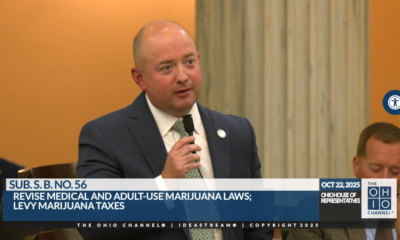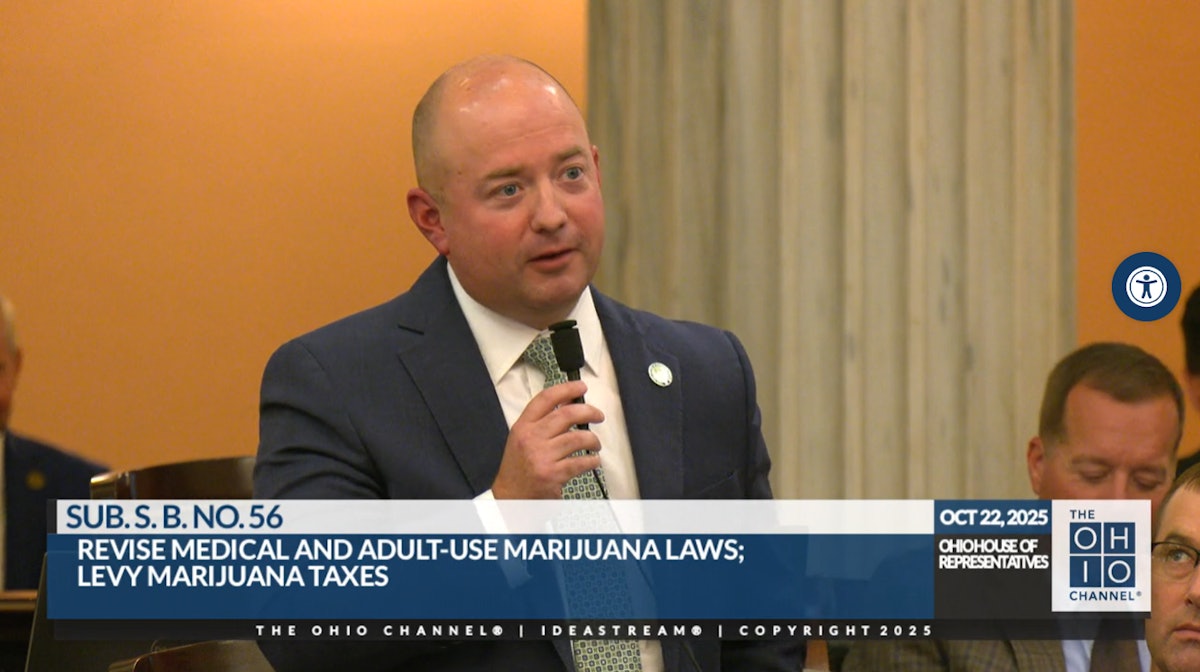featured
Marijuana Possession Arrests Comprised Over 20% of All Drug-Related Arrests in 2024
Published
1 week agoon


State and local law enforcement made nearly 190,000 marijuana possession-related arrests in 2024 — comprising more than 22 percent of all drug arrests nationwide, according to data compiled by the US Federal Bureau of Investigation and posted on its Crime Data Explorer website.
According to the database, police made at least 204,036 arrests for marijuana-related violations last year. (This total is likely an underestimate because some law enforcement agencies fail to report their arrest data to the FBI. The total also fails to calculate how many cannabis-related arrests are included in the tens of thousands of “unspecified drug abuse violations” reported by the FBI.)
Of those arrests, 92 percent (187,792 arrests) were for marijuana possession. The other 16,244 marijuana-related arrests were defined as “sales/manufacturing.”
Overall, the FBI reported 831,446 arrests nationwide for drug-related offenses in 2024.
2024’s marijuana arrest totals are lower than in prior years and they continue a trend that began nearly a decade ago when state governments initially began regulating adult-use marijuana markets — leading to a dramatic decline in cannabis-related arrests in those jurisdictions. Since 2012, 24 states and the District of Columbia have legalized adult-use marijuana possession.

“While the total number of marijuana-related arrests have fallen nationwide in recent years, it is clear that marijuana-related prosecutions still remain a primary driver of drug war enforcement in the United States,” NORML’s Deputy Director Paul Armentano said. “Hundreds of thousands of Americans continue to be arrested annually for low-level cannabis-related violations even though a majority of voters no longer believe that the responsible use of marijuana by adults should be a crime.”
He added: “This is a terribly destructive policy that disrupts lives and has lasting consequences. Low-level marijuana offenders, many of them younger, poor, and people of color, should not be saddled with an arrest, a criminal record, and with the lifelong penalties and stigma associated with it for engaging in behavior that is now legally regulated for adults in nearly half the states in this country.”
Marijuana arrests peaked in the United States in 2007, when police made over 870,000 marijuana-related arrests. At that time, just under half (48 percent) of all drug-related arrests in the United States were for marijuana-related violations. (The FBI changed the way they collected and reported crime data in 2021 making it difficult to compare more recent datasets with those of prior years.)
Since the year 2000, police have made over 16 million marijuana-related arrests in the United States.

Additional information on marijuana-related arrests is available from NORML.
Related

Author: mscannabiz.com
MScannaBIZ for all you Mississippi Cannabis News and Information.
You may like
-


Ohio House Passes Cannabis, Hemp Bill Resulting From ‘Venn Diagram From Hell’
-


What To Know About Cannabis And A Brain Aneurysm
-


MariMed to Expand Brand Distribution to New York
-


Time for a Cannabis Reboot: Local Roots, Fair Markets, Real Change
-


Ohio Health Agency Grants $400,000 To Fund Psychedelics Education And Training For First Responders, Doctors And More
-


Curio Wellness Acquires 4 Greenlight Dispensaries in Missouri
featured
Ohio House Passes Cannabis, Hemp Bill Resulting From ‘Venn Diagram From Hell’
Published
7 hours agoon
October 23, 2025
Ohio House lawmakers passed the 18th version of a bill on Oct. 22 that aims to alter the state’s adult-use cannabis laws that voters approved in 2023, while also creating a tightly defined regulatory framework for hemp products.
The 228-page legislation, Substitute Senate Bill 56, preserves many aspects of the voter-approved initiative, such as home grows (six per adult or 12 per household), sharing between adults 21 and older, and allocating 36% of cannabis excise tax revenues to local municipalities that host dispensaries.
However, the bill would prohibit public consumption at places like music concerts and bar patios, and those caught with cannabis purchased outside the state would be criminalized. No other state where cannabis is legal imposes such restrictions on out-of-state purchases, according to cannabis advocacy group NORML.
In addition, while adults could continue to home cultivate cannabis under the legislation, they’d be restricted to harvesting more than 2.5 ounces of flower, or roughly one plant, with a felony penalty for those who grow more than the number of plants allowed. Also, the bill intends to place a 35% THC cap on flower and a 70% THC cap on extracts for both medical and adult-use cannabis.
“This isn’t what Ohioans voted for, and the fact that this bill is being rushed through the Legislature, with almost no opportunity for public comment, indicates that lawmakers know they are undermining the will of the voters,” NORML Political Director Morgan Fox said in a public statement. “Regardless of where one stands on cannabis issues, everyone should be outraged at this.”
The substitute bill found bipartisan House support in an 87-8 vote on Oct. 22.
Rep. Brian Stewart, R-Ashville, who carried Sub. S.B. 56 in the House, said Wednesday on the chamber floor that the bill “preserves all of the core aspects” of what voters passed two years ago, including access to tested and regulated products from licensed dispensaries.
Stewart also argued that the Legislature has to act to preserve the 36% tax revenue fund for host communities after the Ohio Department of Taxation flagged language in the voter-approved initiative, suggesting that the language failed to properly appropriate the money.
“It was always going to require legislation in this chamber,” he said.
The substitute bill also intends to establish a legal pathway for licensed “hemp dispensaries” to sell regulated and tested intoxicating hemp products, defined as containing more than 0.5 milligrams of delta-9 THC per serving or 2 milligrams per package, or more than 0.5 milligrams of total non-delta-9 THC per package. These sales would be limited to those 21 and older. Those who sell intoxicating hemp products to those under 21 would be guilty of a misdemeanor on the first offense and a felony on a subsequent offense.
Meanwhile, cannabinoid hemp beverages would be defined and regulated differently with a $1.20-per-gallon excise tax (more on this later).
Stewart said provisions included in the 18th version of the substitute bill resulted from a “Venn diagram from hell” that attempted to balance individual liberties, consumer safety, the financial well-being of local communities, and the “need to protect the health and safety” of Ohio children.
“If you’re reading through it and you’re saying, ‘Rep. Stewart, I don’t like Section X, I don’t like Section Y,’ please know you’re in good company. I don’t either,” he said. “This is not the bill that I originally introduced. It’s not the bill that Representative [Tex] Fischer originally introduced. But it is a carefully crafted compromise that makes Ohio better.”
While the Senate passed its version of the legislation in February, cannabis advocacy groups like the Marijuana Policy Project applauded the House Judiciary Committee for sitting on the legislation for nearly eight months as a means to prevent recriminalization measures “pushed by the Senate.”
However, many House members said during this week’s floor debate that Gov. Mike DeWine’s executive order issued Oct. 8 – one that attempts to shut down hemp-derived cannabinoid product sales and initiate emergency rulemaking – spurred lawmakers to go back to the drawing board for a legislative fix.
DeWine showcased various intoxicating hemp products in packaging that mimicked popular candies, like Nerds, Sour Patch Kids and Gushers, during his Oct. 8 press conference.
After lawmakers were at an impasse, DeWine’s executive order represented a turning point on Sub. S.B. 56, Rep. Tex Fischer, R-Boardman, said before Wednesday’s floor vote.
“I think we all had an agreement that that was not the intent of the hemp legislation at the federal level or here in Ohio, but we did need to do something to protect kids from these products,” he said. “Some of these products are truly illicit and truly dangerous, and everybody, no matter how fervent of an activist on the hemp side of this issue you were, agreed something needed to be done.”
Legislative disagreements had revolved around Ohio businesses that would be negatively impacted by language in previous versions of the bill, Fischer said.
Under the House-passed substitute bill, places where children “walk freely,” like gas stations and grocery stores, would be prohibited from selling intoxicating hemp products, while certain intoxicating hemp retailers, such as a qualifying vape shop, would be “grandfathered in” for licensure.
For a retailer to qualify for a grandfathered-in hemp dispensary license, that retailer must have sold intoxicating hemp products on or before Aug. 30, and the store’s receipts from hemp and intoxicating hemp product sales must have exceeded 80% of its total gross receipts for either the past 12 months or the 2024 calendar year.
“What about those people that have poured their blood, sweat, tears, years of work, potentially millions of dollars into building a business living by the rules that we set out, whether they were adequate or not, they were not breaking the law,” Fischer said. “Those were the people that I was motivated to stand up for, and while this bill doesn’t do everything that I wanted or everything that others want, I believe we have arrived at a reasonable conclusion to allow those people to still stay in business, to grandfather them into this new regulatory regime.”
No one under the age of 21 would be allowed inside these hemp dispensaries, which would be prohibited from selling cigarettes, tobacco, and vape or electronic smoking products under the bill. No more than 400 hemp dispensaries would be allowed in the state, unless those grandfathered in exceed that number.
While the biennial license renewal fee for Ohio’s cannabis dispensaries is $70,000, the two-year renewal license fee for a grandfathered-in hemp dispensary would be $35,000 under Sub. S.B. 56.
Meanwhile, hemp beverages, which the substitute bill defines as “drinkable cannabinoid products,” would be regulated differently. In addition, these products would be classified as low-level DCPs (5 milligrams or less of total THC per serving) or high-level DCPs (5-10 milligrams of total THC per serving). Only one serving per container would be allowed.
Neither low-level nor high-level DCPs would constitute an “intoxicating hemp product,” with DCPs falling under a separate regulatory framework for manufacturers, distributors and retailers. Still, sales to those under 21 would be prohibited.
Ohio retailers with Class C liquor licenses, such as grocery stores that sell alcohol for carryout only, would be allowed to sell high-level DCPs. Meanwhile, Ohio retailers with licenses for on-site consumption, such as restaurants and bars, would be allowed to sell low-level DCPs.
While the substitute bill would allow DCP manufacturers to create higher-dose beverages that contain more than 10 milligrams of THC, they would be restricted to distributing and/or selling those products to out-of-state partners.
Fischer said there were a lot of wins “for us so-called ‘hemp-resentatives,’” in the substitute bill.
“Many of you heard from beverage manufacturers, bars, restaurants, retailers about how popular these products are, but there are also a lot of folks that weren’t yet comfortable stocking these products because of the regulatory uncertainty that is a result of our inability to previously come to an agreement here in Columbus,” he said. “I think this strikes the appropriate tone of a reasonable, fair and pro-business regulatory regime while still maintaining that these products and consumers should be safe.”
While it’s unclear if the Senate will agree to the House’s amended substitute bill or take the legislation to a conference committee for further debate – before possibly sending the bill to DeWine’s desk – the potential outcomes are significant for Ohio stakeholders: cannabis businesses, hemp businesses, consumers, patients and children.
Rep. Jamie Callender, R-Concord, a long-time advocate for cannabis reform in the Buckeye State, acknowledged the legislation “is not perfect” before voting to support the bill.
Callender said a “no” vote on the legislation represents allowing retailers to continue selling high-THC products to children walking home from schools with impunity.
“I imagine everybody in this room can find at least one thing they don’t like in the bill, one thing they think can be improved on,” he said. “You have my commitment. I’ll keep working with everyone to make it better, but I believe we have to act.”

Author: mscannabiz.com
MScannaBIZ for all you Mississippi Cannabis News and Information.

Discover what to know about cannabis and a brain aneurysm—risks, recovery, and medical cautions.
When celebrity Kim Kardashian recently revealed she was diagnosed with a small brain aneurysm—reportedly detected during a routine MRI and attributed by her doctors to stress—her disclosure sparked interest in a condition most people don’t know much about. A brain aneurysm is a bulging or ballooning blood vessel in the brain, which can be life-threatening if it ruptures. With growing interest around cannabis use—both medically and recreationally—it’s worth exploring what to know about cannabis and a brain aneurysm.
RELATED: The Science Behind Cannabis And Happiness
A brain aneurysm (sometimes called an intracranial aneurysm) occurs when a weakened area of a blood vessel in the brain bulges outward. If the aneurysm ruptures, it can lead to a major bleed called a subarachnoid hemorrhage—a medical emergency. Many aneurysms remain small and never rupture, but risk factors include high blood pressure, smoking, genetic predisposition, and possibly vascular stress. Kim Kardashian’s case underlines how even individuals with public profiles and access to healthcare can face this silent risk.

Cannabis—or more precisely its components such as cannabidiol (CBD) and tetrahydrocannabinol (THC)—has been studied for a variety of health issues. For some conditions like chronic pain, certain forms of epilepsy, or spasticity in multiple sclerosis, cannabinoids may offer symptomatic relief. There is emerging evidence medical marijuana can improve quality of life for some patients: reducing pain, improving sleep or mood, and even decreasing reliance on opioids in certain contexts.
In the broad sense, in jurisdictions across the U.S., many patients use it under medical supervision for conditions like migraine, nausea from chemotherapy, or chronic neuropathic pain. “Medical” use does not equate to “safe in all contexts”—especially when other serious medical issues are present.
When it comes to brain aneurysms—particularly after diagnosis or treatment—the research raises caution flags about cannabis use:
- Studies show people who have had an aneurysmal subarachnoid hemorrhage (a burst aneurysm), cannabis users had higher rates of delayed cerebral ischemia (DCI)—a serious complication which can lead to poor outcome. One large study found cannabis users had about a 2.7 times greater risk of DCI compared with non-users.
- Other studies link recreational cannabis use to a higher likelihood of having an aneurysm rupture in the first place—one estimate suggested about an 18 % increased risk.
- Research also suggests cannabis affects vascular tone, cerebral blood flow, mitochondrial function in brain cells, and may contribute to vasospasm (narrowing of blood vessels) or oxidative stress—mechanisms which are particularly concerning in someone with a vulnerable blood vessel wall.
- One review warned even for unruptured aneurysms, if cannabis is used, individuals should be aware they may face worse outcomes should rupture occur.
RELATED: Evidence About Burning Mouth Syndrome And Cannabinoids
If you or someone you know has been diagnosed with a brain aneurysm (ruptured or unruptured), here are some practical steps:
- Talk to your neurologist/neurosurgeon about cannabis use. The research suggests elevated risks in people with aneurysms who use cannabis.
- Avoid assuming “medical use = safe.” Even if you’re using cannabis under a physician’s care, an aneurysm changes the risk profile.
- Focus on established risk-reduction: control blood pressure, stop smoking, manage cholesterol, avoid stimulants. These traditional strategies remain foundational.
- If you have an untreated aneurysm and are considering cannabis for medical reasons, proceed with caution.Ask your medical team about the specific size, location, treatment plan of your aneurysm and whether there are recommended restrictions.
- After an aneurysm rupture or treatment, strongly consider abstaining or closely monitoring any cannabis use. The data indicate increased complication rates in this particular setting.
The public disclosure by Kim Kardashian highlights how common aneurysms may be, but it also reminds us the decision to use cannabis in a medical context should be made carefully. While cannabis offers genuine medical benefits for some conditions, when a brain aneurysm is in the picture—especially one which has ruptured or is being observed—caution is warranted. Speak with a neurologist familiar with cerebrovascular risk, weigh the benefits and the unique risks, and make an informed choice rather than assuming “legal = safe.”

Author: mscannabiz.com
MScannaBIZ for all you Mississippi Cannabis News and Information.

[PRESS RELEASE] – NORWOOD, Mass., Oct. 23, 2025 – MariMed Inc., a leading cannabis consumer packaged goods company and retailer, announced a licensing agreement with Farm 2 Hand LLC, a New York State cannabis license holder, that will introduce the company’s top-selling portfolio of products throughout New York State. Terms of the agreement were not disclosed.
Farm 2 Hand intends to manufacture and distribute a variety of MariMed’s edible products as permitted under New York regulations. Those are initially expected to include Betty’s Eddies fruit chews; Bubby’s Baked baked goods; and InHouse gummies. The products will be produced in a new kitchen that MariMed will design and equip for Farm 2 Hand at Farm 2 Hand’s Bronx production facility.
“Expanding the availability of our brands to the Empire State and its $6 billion total addressable market marks a significant step forward in our plan to own top-selling cannabis brands across the U.S.,” MariMed CEO Jon Levine said. “The addition of New York to our distribution footprint will help drive wholesale revenue, and being in the nation’s top media and influencer market will also help increase national awareness for our brands.”
The company expects its products will be available to New York’s 500-plus dispensaries in 2026, following the build-out of the kitchen and regulatory approval.

Author: mscannabiz.com
MScannaBIZ for all you Mississippi Cannabis News and Information.

Ohio House Passes Cannabis, Hemp Bill Resulting From ‘Venn Diagram From Hell’

What To Know About Cannabis And A Brain Aneurysm

MariMed to Expand Brand Distribution to New York

Time for a Cannabis Reboot: Local Roots, Fair Markets, Real Change

Ohio Health Agency Grants $400,000 To Fund Psychedelics Education And Training For First Responders, Doctors And More

Curio Wellness Acquires 4 Greenlight Dispensaries in Missouri

The best places to be high in Seattle

Colombia’s Bold Offer to Trump: Legal Weed Exports for Peace

Trump DOJ Asks Supreme Court For Delayed Schedule In Case On Marijuana Users’ Gun Rights

Whiskey Company Scales Back Operations, Citing ‘Consumer Shifts’ Toward Marijuana As Alcohol Alternative

Smart Cannabis: The AI Revolution No Operator Can Ignore

New Jersey Gubernatorial Candidates Need To Step Up For Cannabis Consumers (Op-Ed)

Millennials Are Spending Big on Luxury Travel

West Virginia Medical Marijuana Revenue Is Supposed To Support Drug Treatment Programs, But Sits Unspent As Officials Worry About Federal Prohibition

Frequent Marijuana Use Is Tied To Lower Risk Of Liver Disease From Alcohol, New Study Finds

Ohio bill to scale back cannabis legalization passed by House (Newsletter: October 23, 2025)

FDA Weighs Petition On ‘Significant Harm’ Of Marijuana Hair Testing Device’s Positive Results From Secondhand Smoke

Wisconsin Lawmakers Rally for Medical Cannabis Legalization in Committee Hearing

Massachusetts Campaign To Roll Back Marijuana Legalization Law Is ‘On Track’ To Make 2026 Ballot, Spokesperson Says

Village Farms Introduces Industry-First, One-Way Aroma Valve in Cannabis Packaging

Ohio House Passes Bill To Remove Voter-Approved Marijuana Legalization Protections And Restrict Hemp Market

Sorting Robotics Becomes Cannabis Manufacturing’s First True Systems Integrator

Wisconsin Senators Hold Hearing On GOP Leader’s New Medical Marijuana Legalization Bill

Tariffs And Visas Add To The Cannabis Industry’s Misery

Alert: Department of Cannabis Control updates data dashboards with full data for 2023

Connecticut Appoints The US’s First Cannabis Ombudsperson – Yes there is a pun in there and I’m Sure Erin Kirk Is Going To Hear It More Than Once!

5 best CBD creams of 2024 by Leafly

Recreational cannabis on ballot for third time in South Dakota

EU initiative begins bid to open access to psychedelic therapies
New Study Analyzes the Effects of THCV, CBD on Weight Loss

Free delta-9 gummies from Bay Smokes

5 best autoflower seed banks of 2024 by Leafly

Discover New York’s dankest cannabis brands [September 2024]

May 2024 Leafly HighLight: Pink Runtz strain

Press Release: CANNRA Calls for Farm Bill to Clarify Existing State Authority to Regulate Hemp Products

5 best THC drinks of 2024 by Leafly

Local medical cannabis dispensary reacts to MSDH pulling Rapid Analytics License – WLBT

6 best CBD gummies of 2024 by Leafly

Curaleaf Start Process Of Getting Their Claws Into The UK’s National Health System – With Former MP (Resigned Today 30/5/24) As The Front Man

Horn Lake denies cannabis dispensary request to allow sale of drug paraphernalia and Sunday sales | News

5 best delta-9 THC gummies of 2024 by Leafly

The Daily Hit: October 2, 2024

Mississippi city official pleads guilty to selling fake CBD products

Nevada CCB to Accept Applications for Cannabis Establishments in White Pine County – “Only one cultivation and one production license will be awarded in White Pine County”

Weekly Update: Monday, May 13, 2024 including, New Guide for Renewals & May Board meeting application deadline

5 best THCA flower of 2024 by Leafly

6 best hemp pre-rolls of 2024 by Leafly

PRESS RELEASE : Justice Department Submits Proposed Regulation to Reschedule Marijuana
Trending
-

 California Cannabis Updates1 year ago
California Cannabis Updates1 year agoAlert: Department of Cannabis Control updates data dashboards with full data for 2023
-

 Breaking News1 year ago
Breaking News1 year agoConnecticut Appoints The US’s First Cannabis Ombudsperson – Yes there is a pun in there and I’m Sure Erin Kirk Is Going To Hear It More Than Once!
-

 best list1 year ago
best list1 year ago5 best CBD creams of 2024 by Leafly
-

 Business1 year ago
Business1 year agoRecreational cannabis on ballot for third time in South Dakota
-

 Business1 year ago
Business1 year agoEU initiative begins bid to open access to psychedelic therapies
-

 cbd1 year ago
cbd1 year agoNew Study Analyzes the Effects of THCV, CBD on Weight Loss
-

 Bay Smokes1 year ago
Bay Smokes1 year agoFree delta-9 gummies from Bay Smokes
-

 autoflower seeds1 year ago
autoflower seeds1 year ago5 best autoflower seed banks of 2024 by Leafly


